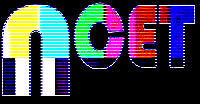 |
The Humanities Television Workshop was the brainchild of Paul Kaufman. It was the last project undertaken at NCET (1975), and arguably the most ambitious. The finished product was intended as a pilot for a more extensive effort based on the core concept - an exploration of the meaning of 'progress' - while simultaneously attempting a marriage of the conventionally dramatic, the didactic, and the experimentally artistic styles possible in the video/television medium. For the Center, this was an entirely natural direction, as considerable skills had been amassed by NCET's artists, and it was likely true that NCET would have likely have run out of funding unless some practical and marketable applications could be found for those abilities.
On another level, the philosophical underpinnings of the project were slanted in the direction of the avant garde, and the ecological, in that 'progress' was assumed to be a potential 'Faustian bargain' - as more recent global events have strongly suggested.
The final product consisted of two major sections. The first half was the Ecotopia pilot itself, and the second was a rather more impressionistic essay - Images of Perfection: an essay in visual thinking, by Don Hallock (in-house title: Suite for Paul).
The Ecotopia pilot was itself formed of two independent production efforts. The first dramatized the opening of the book Ecotopia, by Ernest Callenbach, then editor of Film Quarterly, and was directed by Robert Zagone. The second offered a glimpse of what Ecotopian television might look like.
Technically, the Ecotopia pilot was filmed in 16 mm, and transfered to 2 inch broadcast quality video tape. The Ecotopia 'television presentation,' and Images of Perfection were both recorded directly to 2 inch video tape.
~~~~~
~~ THE ECOTOPIA PILOT ~~
In Ecotopia, Calfornia been designated as an unusually autonomous portion of the United States, in an attempt to discover whether a self-sustaining, ecological paradise could be created, thus prolonging the tenancy of humanity on Earth. The newly created territory, however, becomes increasingly separatist in the implementation of it's new life-style. The US government, distressed at this de-facto near-cecession, decides to send a respected reporter William Weston (played by Peter Donat) to investigate and return with information and insights. The first two screens orient the viewer to the story. |
 |
| |
 |
 |
 |
 |
 |
| |
|
|
|
|
| |
 |
|
 |
|
| |
Weston receives his assignment.... |
|
| |
|
|
| |
 |
|
 |
|
| |
Weston arrives in Ecotopia and, in his hotel room, begins dictating his reports. |
|
| |
|
|
|
|
~~ ECOTOPIAN TELEVISION ~~
Paul Kaufman and Stephen Beck collaborated here to create a video work which would attempt an unusually didactic statement with the Direct Video Synthesizer. The piece demonstrated clearly Stephen's mastery of his tools, and the range of expression that he found possible - as the following set of frames will demonstrate.
 |
 |
 |
 |
 |
| |
|
|
Originally, we are seen living in a natural paradise.... |
|
| |
|
|
|
|
| |
 |
|
 |
|
| |
....but a strange vibration seizes us (the intoxicating notion of progress!). |
|
We are now seen in a self-created, alien environment. (And the story unfolds from there.) |
|
| |
|
|
|
|
| |
 |
|
 |
|
| |
|
|
|
|
| |
 |
|
 |
|
| |
|
|
|
|
| |
 |
|
 |
|
| |
|
|
|
|
| |
 |
|
 |
|
| |
|
|
|
|
| |
 |
|
 |
|
| |
|
|
|
|
| |
 |
|
 |
|
| |
|
|
|
|
| |
 |
|
 |
|
| |
|
|
|
|
| |
 |
|
 |
|
| |
|
|
|
|
| |
 |
|
 |
|
| |
|
|
|
|
| |
|
|
|
|
|
|

